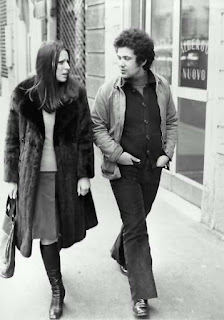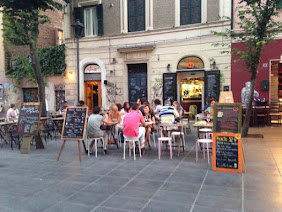‘Poet of music’ who spoke for the marginalised in society
 |
Fabrizio De André's lyrics are studied by Italian
students as part of the school curriculum |
The singer-songwriter Fabrizio De André, whose songs often celebrated the lives of the marginalised in Italian society and gained him a popularity that has already outlived him by a quarter of a century, died on this day in 1999 in the Città Studi district of Milan.
De André, who was a month short of his 59th birthday, had been diagnosed with lung cancer six months earlier, having been a heavy smoker for much of his adult life. After his death at the Istituto Nazionale dei Tumori, his body was returned to his native Genoa, where a crowd estimated at between 10,000 and 20,000 gathered for his funeral at the Basilica di Santa Maria Assunta in Carignano.
His impact on Italian culture has been such that streets, squares and schools in many towns and cities bear his name. A three-hour tribute to him broadcast on a relatively obscure Italian TV channel to mark the 10th anniversary of his death attracted an audience of almost eight million viewers, as many as tuned in to the new series of Grande Fratello - the Italian version of Big Brother - on a mainstream channel the following evening.
Nicknamed ‘Faber’ by his close friend, the writer and comic actor Paolo Villaggio, and known as ‘the songwriter of the marginalised’ and ‘the poet of the defeated’ as well as simply the ‘poet of music’, De André had a voice of warmth and depth but it was for his lyrics that he acquired a huge following.
 |
De André drew inspiration from
the streets of his home city |
Many of his songs told stories of outcasts and rebels or tackled subjects such as prostitution and homosexuality that others regarded as off-limits in a country where the Catholic Church still loomed large over public morality. He did not shy from criticising the church itself, which he felt was riddled with hypocrisy.
His lyrics are often included in school anthologies of modern poetry and he has attained the status of cult hero among some on the Italian political left, itself increasingly marginalised by the shift towards the centre and the right.
Although sometimes spoken of as Italy’s Bob Dylan, De André’s major influences were said to be Leonard Cohen, the Canadian singer-songwriter also renowned for deeply meaningful lyrics, and the French singer-songwriter and poet, Georges Bressens, to whom he was introduced when his father gave him some records as a teenager. It was Bressens who inspired De André to be a pacifist and a libertarian.
He was a jazz enthusiast in his youth, singing and playing the guitar at La Borsa di Arlecchino, a café-theatre located in the basement of the Palazzo della Borsa in Genoa. Always willing to experiment, he explored many types of music in his career, as well as singing in Genoese and Neapolitan dialects in addition to Italian.
Born into a relatively prosperous family in the Pegli district of Genoa in 1940, De André’s early life was inevitably shaped by the war into which Italy was led by Benito Mussolini’s alliance with Hitler and Nazi Germany. His father, Giuseppe, who had made his money through his purchase of a technical institute in the city, was fervently anti-Fascist, which was part of his reason for taking the family to live in a farmhouse in his native Piemonte, both to avoid the attention of the authorities and to escape Allied bombing. They would not return to Genoa until 1945.
 |
The writer and comic actor Paolo Villaggio was
De André's close friend and supporter |
It was not long before De André began to show both musical talent and a rebellious streak, at the age of eight paying off his violin teacher to let him skip lessons. Later, he would drop out of law school after receiving royalties from a song -
La canzone di Marinella (Marinella’s song) - which he sold to
Mina, Italy’s all-time biggest selling female star. Its lyrics, which told the story of a young orphan forced into prostitution, provided early evidence of De André’s fascination with the low-life characters populating Genoa's back streets.
He was still a student when he made his stage debut in February 1961, singing two songs as part of a programme of music in a theatre in Genoa. The two songs - Nuvole barocche (Baroque clouds) and E fu la notte (And it was night) were the A and B sides of his debut single, released in 1961.
Although it was 1975 before he could be persuaded to appear on stage in a solo concert, his career would ultimately stretch over four decades, during which he released 14 studio albums, a number of live albums, and numerous singles. Songs such that established his status as a songwriter and singer of note included Amico fragile, written in stream-of-consciousness style about a drunken evening with friends; Crêuza de mä, a song in Genoese dialect about the tough lives of sailors and fishermen in Genoa; and La ballata del Michè, a song based on the true story of a southern Italian emigrant to Genoa who was sentenced to 20 years in jail after killing a man who had tried to seduce his girlfriend.
Some of his songs were based on his own life experience, not least his kidnapping in 1979, along with his partner, Dori Ghezzi, by bandits in Sardinia, where they lived. They were held for four months until his father paid a ransom, said to be one billion lire. Afterwards, De André wrote Hotel Supramonte, drawing the title from the mountains where he was imprisoned, in which he likened their captivity to the feeling of confinement in love.
 |
De André's career spanned
almost 40 years |
At the trial of the men who seized him, he chose not to condemn his captors, saying that “they were the real prisoners, not I” and blaming the organised crime bosses who made the bandits do their dirty work for them.
Although considered a subversive by the Italian police, De André was never actively involved with politics. Indeed, when the student riots were taking place in 1968, he spent his time writing an album about Jesus, portraying Christ as a revolutionary hero fighting for freedom. Songs from the album are still played in churches, despite De André's lack of faith.
His adoption by the left as a favourite son followed Silvio Berlusconi’s election victory in 2008, when he won a third term as prime minister, following the collapse of Romano Prodi’s centre left Olive Tree coalition.
Ironically, as they tried to make ends meet during the early 1960s, De Andre and Villaggio would sometimes take work as cruise ships musicians in the backing groups supporting Berlusconi, who was then a singer.
Married twice, to Enrica Rignon, known to him as Puny, and later to Ghezzi, he left two children, a son, Cristiano, from his first marriage, and a daughter, known as Luvi. After his death, he was laid to rest in the monumental Staglieno cemetery, in the De André family chapel.
 |
Pegli is an affluent, mainly residential suburb
but has a lively seafront promenade |
Travel tip:
Pegli, where Fabrizio De André was born, is a mainly residential area of Genoa but boasts a lively seafront promenade and a number of hotels. There are good links by road, rail and boat to the central area of Genoa. The port city of Genoa, the capital of the Liguria region, has a rich history as a powerful trading centre with considerable wealth built on its shipyards and steelworks, but also boasts many fine buildings, many of which have been restored to their original splendour. The Doge's Palace, the 16th century Royal Palace and the Romanesque-Renaissance style San Lorenzo Cathedral are just three examples. The area around the restored harbour area offers a maze of fascinating alleys and squares, enhanced recently by the work of Genoa architect Renzo Piano, and a landmark aquarium, the largest in Italy.
 |
The cloister at the main building of the University
of Milan, founded in 1924 |
Travel tip:
Città Studi, where De André was treated at the Istituto Nazionale dei Tumori, is Milan’s university district. It developed from 1915 onwards to the northeast of the city centre, although there are other buildings around the city that are now part of the University. The streets of the Città Studi area are notable for bars, pizza restaurants and ice cream shops. The University of Milan was founded in 1924 from the merger of two other academic institutions. By 1928, it already had the fourth-highest number of enrolled students in Italy, after Naples, Rome and Padua. Colloquially referred to as La Statale, it is today one of the largest universities in Europe, with about 60,000 students, and a permanent teaching and research staff of about 2,000.
Also on this day:
1693: Earthquake in southeastern Sicily
1944: The death of Fascist politician Galeazzo Ciano
1975: The birth of the politician Matteo Renzi
1980: The birth of the Giannini sextuplets
Home

.jpg)











.jpg)
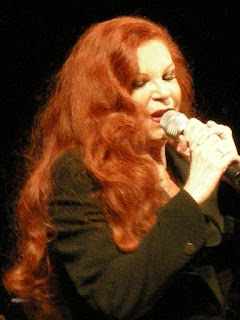
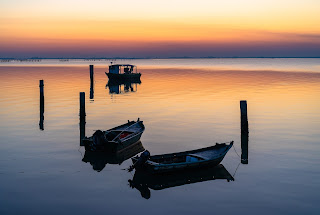
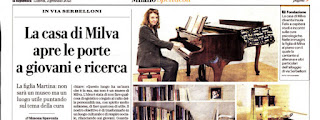

_in_1968.jpg)
